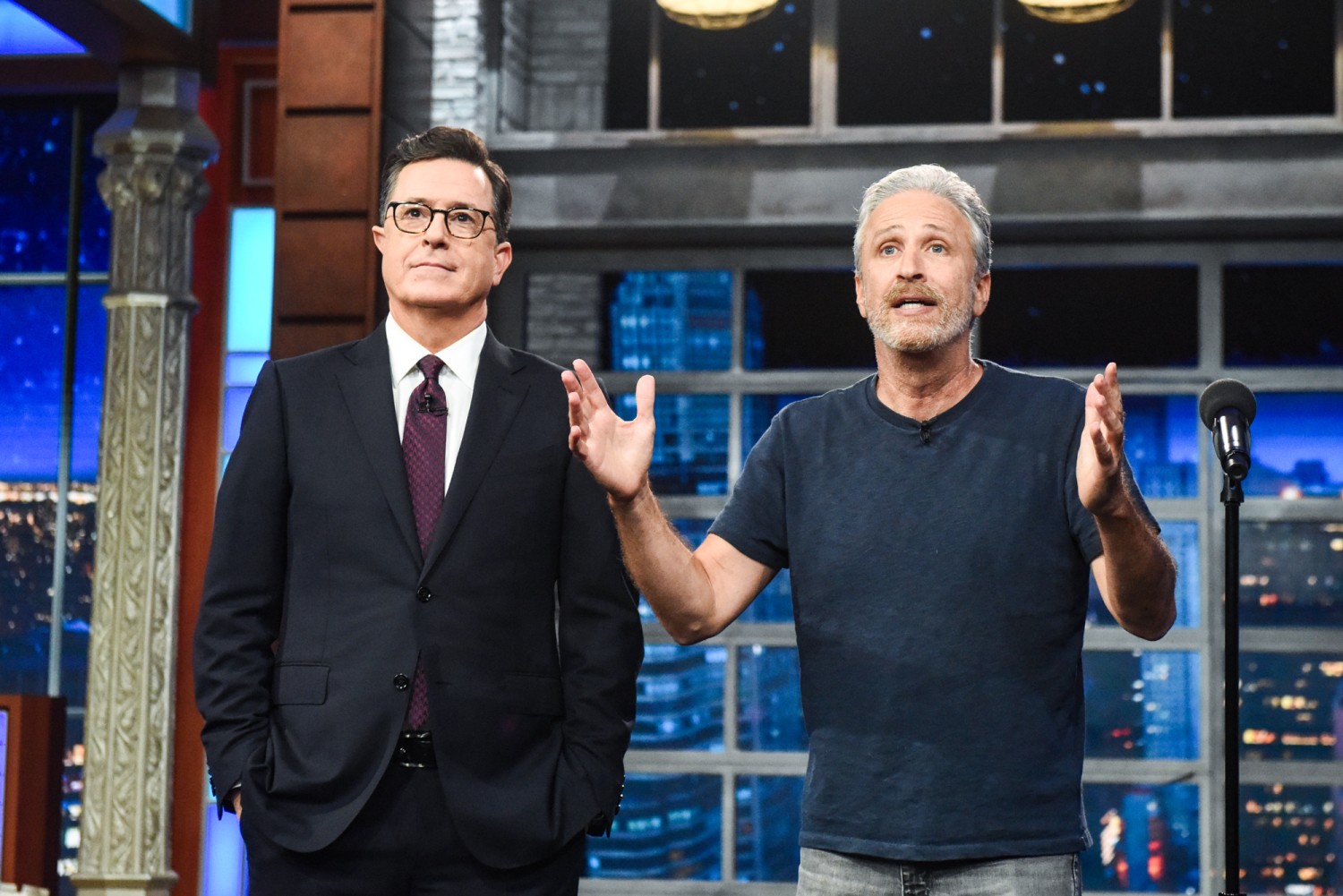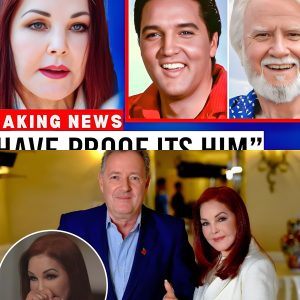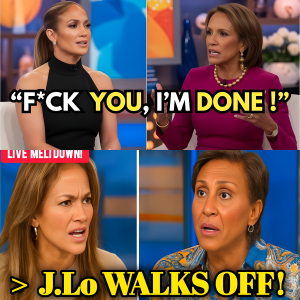“CBS Has No Idea What’s Coming” — Jon Stewart and Stephen Colbert’s Secret Meeting Sparks a Bold Comeback Plot That Could Rock the Network to Its Core
There was no announcement. No warning. No press camped out in the hallway. No phones buzzing with last-minute confirmations. Just a quiet entrance, at 9:48 PM, through a side door of The Peninsula Hotel in Manhattan. One man walked in, and everything changed.
Inside, waiting alone and silent, was Stephen Colbert, his eyes fixed on an untouched glass of bourbon.

Three weeks earlier, CBS had abruptly canceled The Late Show with Stephen Colbert. There was no tribute, no final thank you, no audience farewell. Just dead air and a press release. Colbert reportedly learned of the decision only hours before the world did.
CBS thought cutting the cord would end the story in silence.
But Colbert didn’t protest. He didn’t post on social media. He didn’t run to another network or schedule a tell-all interview. He simply vanished from public view.
Until now.
Jon Stewart wasn’t expected at the hotel that night. He’d finished taping The Daily Show earlier—his only weekly episode—and left the studio just after 7 PM. By 9:48, he was in a dimly lit room, with no producers, no contract to discuss, and no cameras rolling.
What happened in the next 43 minutes remains undocumented. No footage. No audio. No transcript. No one at CBS will admit it even happened.
But hotel staff saw Stewart arrive, and they noticed something: he wasn’t smiling when he entered, and he looked shaken when he left.
“They weren’t meeting to catch up,” recalled one hotel employee. “There was a table, two chairs, and a folder stamped CONFIDENTIAL. That’s all I needed to know.”
No one knows for sure what was inside that folder. But rumors swirl: it contained a final segment script Colbert never aired, a list of unsent emails, and a plan—codenamed “Archangel”—linked to a proposal CBS buried in 2021.
We weren’t supposed to know any of this. But word got out.
Something happened in that room that left Stewart speechless.
“He didn’t say anything to the front desk when he left. Didn’t even look up,” another witness said. “It was like he’d just left a funeral.”
One sentence, whispered behind closed doors, was all it took. No one who heard it has dared to repeat it.
The next morning, CBS system logs recorded multiple access attempts to archived planning documents from The Late Show’s final week. All were denied. Files disappeared. A folder named “FinalDraft_Archangel” was manually deleted at 6:12 AM. A “Q3 Segment Strategy” meeting on the 17th floor was canceled, replaced by a cryptic “Executive Contingency” event.
One assistant called it an error. Another called it something else: “This wasn’t cleanup. It was containment.”
What shook staff the most was a legal order freezing all internal communications containing the words “Colbert,” “plan,” or “Stewart.” Not just emails—calendar invites, Slack messages, even meeting room names were changed.
“It was like they knew what he said—and were terrified we’d find out,” said one staffer.
Back at The Daily Show, Stewart remained silent about the meeting. He canceled his next two appearances. No press, no follow-ups, no explanation. That week’s monologue, originally about the election, never aired. Instead, the screen went black. Then a line of white text appeared:
“Some truths don’t belong to ratings.”
The clip lasted five seconds before the network cut to a rerun.
What did Stewart hear in that room? What was in the folder? Why did one of CBS’s most protected internal files vanish less than twelve hours later? And why did Gayle King—CBS veteran and Colbert ally—miss a live morning broadcast for the first time in two years, just two days after the meeting? There was no explanation, no stand-in, no on-air acknowledgment. Just… emptiness.
“People noticed,” said a camera operator. “But no one dared say a word.”
:max_bytes(150000):strip_icc():focal(703x253:705x255)/stephen-colvert-jon-sttewart-021124-32292816480f4756b35e7c038a8f7150.jpg)
What no one realized then—but is slowly coming to light now—is that Colbert never walked away. He walked out. There’s a difference. Walking away is resignation. Silence. Surrender. Walking out is a beginning.
Sources close to the matter say Colbert had prepared something CBS never approved: a segment, a letter, maybe something else entirely. It was never aired, never signed, never broadcast. But it was printed and tucked away in a file drawer, with one sentence circled in red ink:
“I stayed quiet because you feared my voice. And I’m speaking now because I no longer fear yours.”
That sentence never made it to air. But Stewart saw it, read it, and, according to a production assistant, whispered: “You’re really going to do this.”
Colbert didn’t answer.
What CBS may not realize—or refuses to acknowledge—is that “Archangel” wasn’t a show. It was a blueprint shared with a small circle of trusted writers, allies, and producers. Its purpose: to outlast and outmaneuver the system that tried to silence it.
The theory: if CBS ever cut Colbert, he would cut himself loose—and launch a platform where he could broadcast without filters, boards, or anyone dictating what was “safe.” Not a YouTube channel, not a podcast, not a rival network show. Something new.
That’s what Stewart saw. That’s what left him speechless. That’s why, even now, he won’t go on record. Some moments don’t need to be recorded to be remembered. Some moments don’t get headlines—they become them.
Inside CBS, fear has shifted. At first, they feared Colbert might lash out. Now, they fear he won’t.
“Everyone’s walking on glass,” said a junior executive. “It’s not what they know that scares them. It’s what they don’t.”
This past Monday, someone with an unverified IP address logged into CBS’s private intranet and attempted to download archived footage from June 2025. The attempt failed. The login traced to a location four blocks from Colbert’s reported Upper West Side townhouse.
No confirmation. But the timing fits.
Then there was the Twitter post. At 2:13 AM, a now-deleted account tweeted:
“The revolution doesn’t air at 11:30 anymore. It uploads itself.”
The tweet received 700 retweets before vanishing. No one claimed credit. But a reverse search of the handle led back to a burner email once used by a former segment editor—the same one who left CBS without explanation six weeks before the show’s cancellation.
None of this is proof. But all of it feels like a warning.
Because when the cameras are off, the doors are closed, and two men meet in silence—something gets written. Sometimes, that something doesn’t need a logo to go viral. It just needs the right eyes to see it.
That’s what CBS forgot. They controlled the show. But they never controlled the story.
Now, the story is out of their hands.
This week, Stewart skipped his scheduled Monday appearance again. No replacement. No statement. Just an old clip airing in its place—a 2011 interview where Colbert once asked Stewart:
“What happens if they silence us?”
Stewart smiled. “They won’t. Because the silence will say it louder.”
That clip once ended in laughter. Today, it doesn’t feel funny.
Something changed in that room. We don’t know the sentence. We may never hear it. But those who were there—or close enough to know—say this much:
“They unplugged the man. But they forgot he built the grid.”
One meeting. One file. One whisper that may never be repeated.
Now, an entire empire waits.
Because if the plan is real—if it lives—it won’t be aired.
It will be unleashed.
And when that happens, no one will be safe from what they tried to bury.





